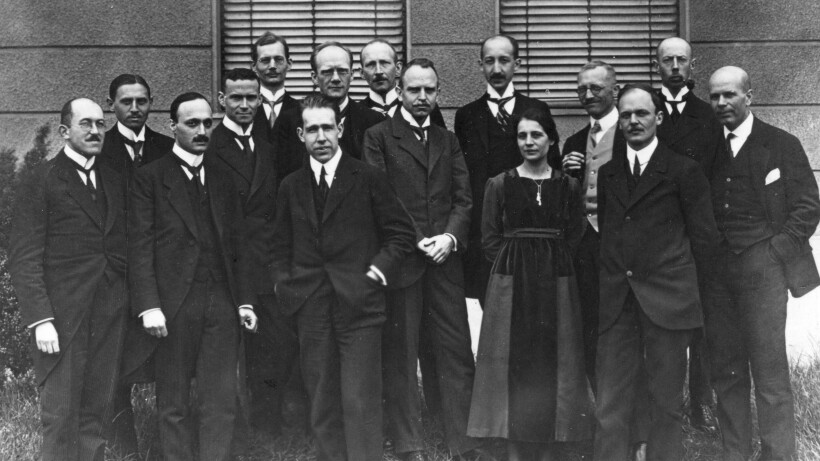
Participants at the 1920 “bonzenfreie Kolloquium” held for Niels Bohr at Dahlem in Berlin. Left to right are: Otto Stern, Wilhelm Lenz, James Franck, Rudolph Ladenburg, Paul Knipping, Niels Bohr, Ernst Wagner, Otto von Baeyer, Otto Hahn, George de Hevesy, Lise Meitner, Wilhelm Westphal, Hans Geiger, Gustav Hertz, and Peter Pringsheim.
AIP Emilio Segrè Visual Archives, Aristid V. Grosse Collection.
With the International Year of Quantum Science and Technology drawing toward its close, many of the world’s foremost experts on the history of quantum physics are gathering next week in Berlin for a symposium.
From the organizers
In the 100 years since Werner Heisenberg’s “Über quantentheoretische Umdeutung kinematischer und mechanischer Größen” offered the first glimpses of a new theory in the summer of 1925, quantum mechanics has gone on to become a foundational part of modern physics—to the extent that it sometimes becomes hard to make a distinction between quantum physics and physics itself. And for the last twenty years, Berlin was an international center for the study of the history of quantum physics, first with the project “History and Foundations of Quantum Physics” (2006–2012) at the Fritz Haber Institute and the Max Planck Institute for the History of Science, then with the research group “Historical Epistemology of the Final Theory Program” (2018–2025) at the Max Planck Institute for the History of Science and the Albert Einstein Institute. As this long tradition comes to an end, and in celebration of the centenary of quantum mechanics, this conference will gather world-leading experts on many aspects of “quantum history” to reflect on past achievements and look to the future.
The range of topics will stretch from the beginnings of quantum physics around 1900, when physicists first started to explore the limits of (what would come to be known as) classical physics, over the construction of quantum mechanics itself in the 1920s, to the manifold applications and the interpretation debate that ensued. A second major focus lies on the second half of the twentieth century, when physicists revisited foundational aspects of quantum physics in the “Second Quantum Revolution” and again explored limits, now those of quantum physics itself, in the search for a final theory. The third main focus lies on exploring the social and cultural contexts of the quantum revolution(s), its unprecedented global spread, and the role of underrepresented demographics.
Program
Session 1: Classical physics and the scaffold of quantum theory
Coordinator: Michel Janssen
Talks: Bretislav Friedrich, Douglas Stone, and Simon Saunders
Panel: Massimilano Badino, Dieter Hoffmann, Ricardo Karam, Daniela Monaldi, and Jos Uffink
Session 2: From the scaffold to the arch of quantum physics
Coordinator: Michel Janssen
Talks: Domenico Giulini and Alex Blum
Panel: Guido Bacciagaluppi, Arianna Borrelli, Christian Joas, Christoph Lehner, Oliver Passon, Robert Rynasiewicz, and Tilman Sauer
Session 3: Social and cultural, institutional, and technological contexts of the quantum revolution
Coordinator: Ana Simões
Talks: Arne Schirrmacher and Danian Hu
Panel: Christian Joas, Roberto Lalli, Kostas Gavroglu, Joe Martin, and Olival Freire Jr.
Session 4: Quantum field theory and the search for a final theory
Coordinator: Alex Blum
Talks: Thiago Hartz, Bernadette Lessel, and Claus Kiefer
Panel: James Fraser, Jinyan Liu, Jan Plefka, Don Salisbury, Jürgen Jost, and Stefano Furlan
Session 5: Condensed matter physics and postwar applications of quantum theory
Coordinator: Nuria Muñoz
Talks: Joe Martin and Andy Zangwill
Panel: Maria Paula Diogo, Rocco Gaudenzi, Kostas Gavroglu, Klaus von Klitzing, Jean-Philippe Martinez, Uli Schollwöck, and Ana Simões
Session 6: Women in the history of quantum physics
Coordinator: Margriet van der Heijden
Talks: Daniela Monaldi and Ana Simões & Maria Paula Diogo
Panel: Stefano Furlan, Dieter Hoffmann, Jinyan Liu, and Arne Schirrmacher
Session 7: Second quantum revolution
Coordinator: Jürgen Renn
Talks: Kristian Camilleri and Olival Freire Jr.
Panel: Guido Bacciagaluppi, Hanoch Gutfreund, Guy Hetzroni, Christoph Lehner, and Noah Stemeroff
Session 8: Interpreting quantum mechanics
Coordinator: Guido Bacciagaluppi
Talks: Mike Cuffaro and Christoph Lehner
Panel: Markus Aspelmeyer, Kristian Camilleri, Jürg Fröhlich, Simon Saunders, and Jos Uffink
You can sign up to receive the Weekly Edition and other AIP newsletters by email here.



